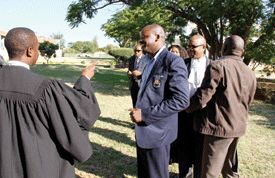Unions score big
ISAIAH MOREWAGAE
Staff Writer
| Thursday May 16, 2013 00:00


Others in raft of contestable decisions that government took were: cessation of assistance with deduction of loan repayments, cessation of the secondment of public service employees to unions, and cessation of transportation of employee representatives to congresses, annual conferences and governing councils.
In declaring Bakwena's decision null and void, Justice Moroka agreed with the union's argument that the decision to terminate their organisational rights without giving them a hearing had rendered it unfair and unlawful.'It requires no rocket scientist to notice that an abrupt unilateral withdrawal of officers seconded to the unions would leave the offices without office bearers,' Moroka said. 'The secondment of these office bearers is in the recognition agreements signed by the parties.'Similarly, Justice Moroka said the sudden withdrawal of office accommodation to unions had a disruptive effect to the day-to-day operations of the unions.
In a similar vein, the sudden withdrawal of services such as deduction of union dues and loan repayments directly from employees' salaries had the potential of depriving the unions of their finances that were their lifelines.Justice Moroka dismissed the contention by the state that tough economic times had warranted the withdrawal of the services. 'From available evidence, the deductions involve provision of a deduction code to the unions who then compile a list of their members qualifying for such deductions,' he said. 'The unions then electronically transmit the list to DPSM, who then feeds it into a computer and then monthly deductions would be done with no additional manpower requirements on a monthly basis.'
Moroka also noted that except for arguing that the practices were not sustainable and that unions had the capacity to carry out the functions themselves, DPSM had not given an answer to the procedural propriety of the decisions.Justice Moroka noted that the unions had argued that DPSM's conduct in terminating loan deductions directly from employees' salaries was selective because the same services were extended to loan institutions such as Letshego, Botswana Police Service, Botswana Defence Force and the Nursing Association of Botswana who also ran micro loan businesses and had repayments deducted directly from public servants' salaries.He characterised DPSM's failure to issue an agenda as negotiation by ambush and therefore inconsistent with good labour relations.
'Worse still, the decision to terminate the agreement without affording unions an opportunity to make an input is clear violation audi rule (the right to be heard),' said Justice Moroka.He added that the issue centred on whether unions had an expectation that the substantive rights conferred by the recognition agreements signed with the employer would be honoured. At a procedural level,' he noted, 'unions had a legitimate expectation that enjoyment of such rights (would) not be terminated without affording them an opportunity to make an input. He found that indeed unions had a legitimate expectation to be heard before an adverse decision against them could be taken.
The unions that make up BOFEPUSU are the Botswana Public Employees Union (BOPEU), the Botswana Teachers Union (BTU), the Botswana Secondary Teachers Union (BOSETU), the Botswana Land Boards, Local Authorities and Health Workers' Union (BLLAHWU), and the National Amalgamated Local & Central Government Workers 'Union (NALCGWU).Apearances: Attorneys Tshiamo Rantao of Rantao Kewagamang Attorneys and Mboki Chilisa for the unions; attorney Nchunga Nchunga of Attorney Generals Chambers for the government.
